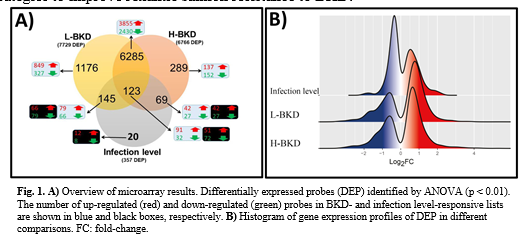PROFILING THE GLOBAL GENE EXPRESSION RESPONSE OF ATLANTIC SALMON TO ENTERIC REDMOUTH DISEASE
Bacterial Kidney Disease (BKD), which is caused by a Gram-positive, intracellular bacterial pathogen (Renibacterium salmoninarum), affects salmonids including Atlantic salmon (Salmo salar). However, the transcriptome response of Atlantic salmon to BKD remained uncharacterised. A 44K salmonid microarray platform was used to improve our understanding of the transcriptome response of Atlantic salmon to BKD. Fish (54 ± 6 g) were infected with R. salmoninarum and, after 13 days post-infection, head kidney samples were collected. Via the TaqMan-based estimation of the pathogen load in those samples, fish (n=5) with no (Control), a high (H-BKD) or a low (L-BKD) infection level were selected for microarray analyses. There were 6,766 and 7,729 differentially expressed probes (ANOVA: p<0.01) in the H-BKD and L-BKD groups, respectively, compared with non-infected control group. We identified 357 probes responsive to the infection level (H-BKD vs. L-BKD). Our Gene Ontology (GO) term enrichment analysis showed dysregulation of several adaptive and innate immune processes in BKD-infected Atlantic salmon. Adaptive immune pathways related with lymphocyte differentiation and activation (e.g. lymphocyte chemotaxis, T-cell cytokine production, T-cell activation and immunoglobulin secretion), as well as antigen-presenting cell functions (e.g. MHC class I-related processes), were found to be dysregulated in response to BKD. The infection level-responsive transcripts were associated to several mechanisms including the JAK-STAT signalling pathway, B-cell differentiation and interleukin-1 responses. Sixty-five microarray-identified transcripts were used for qPCR validation, and all of the transcripts showed the same fold-change direction as microarray results. The present study revealed diverse immune mechanisms dysregulated by BKD in Atlantic salmon, and enhanced the current understanding of Atlantic salmon response to bacterial pathogens. The identified biomarker genes can be used in the development of therapeutic diets and other strategies to improve Atlantic salmon resistance to BKD.
